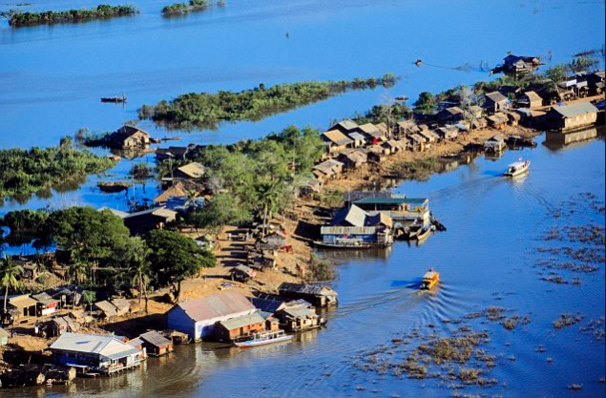Cambodia's Great Tonle Sap Lake sits just 15 km south of town, an one of a kind eco-framework and social range offering the chance to see an alternate side of the Siem Reap - coasting towns, social and nature visits, birdwatching.
The Tonle Sap Lake is the most conspicuous component on the guide of Cambodia - an enormous dumbbell-molded waterway extending over the northwest of the nation. In the wet season, the lake is one of the biggest freshwater lakes in Asia, swelling to a far reaching 12,000 km2. Amid the dry portion of the year it therapists to as little as 2500 km2, depleting into the Tonle Sap River, which winds southeast, in the end converging with the Mekong River at the "chaktomuk" conversion at Phnom Penh. Amid the wet season a remarkable hydrologic marvel causes the Tonle Sap River to invert bearing, filling the lake.
The motor of this marvel is the Mekong River, which gets to be bloated with snow melt and overflow from the rainstorm downpours. The swollen Mekong moves down into the Tonle Sap at the point where the streams meet at Chaktomuk, compelling the waters of the Tonle Sap River once again into the lake. The inflow grows the region of lake more than five-fold, immersing the encompassing forested floodplain and supporting an uncommonly rich and various eco-framework.
More than 100 assortments of waterbirds including a few undermined and jeopardized species, more than 200 types of fish, and additionally crocodiles, turtles, macaques, otter and other natural life occupy the immersed mangrove woods. The Lake is additionally an imperative business asset, giving more than half of the fish devoured in Cambodia. In concordance with the specific biological communities, the human occupations at the edges of the lake is comparably particular - drifting towns, towering stilted houses, gigantic fish traps, and an economy and lifestyle profoundly interweaved with the lake, the fish, the natural life and the cycles of rising and falling waters.


No comments:
Post a Comment